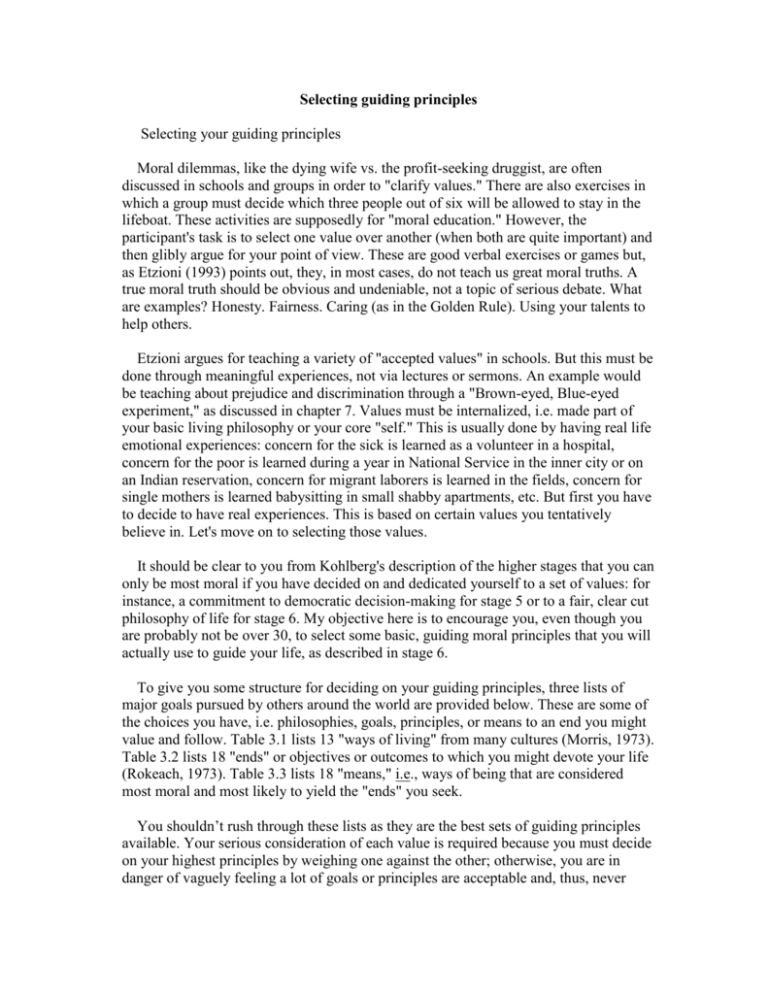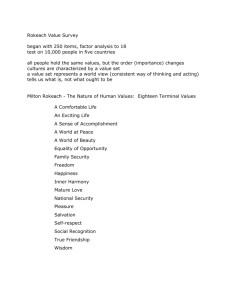Values-Selecting guiding principles
advertisement

Selecting guiding principles Selecting your guiding principles Moral dilemmas, like the dying wife vs. the profit-seeking druggist, are often discussed in schools and groups in order to "clarify values." There are also exercises in which a group must decide which three people out of six will be allowed to stay in the lifeboat. These activities are supposedly for "moral education." However, the participant's task is to select one value over another (when both are quite important) and then glibly argue for your point of view. These are good verbal exercises or games but, as Etzioni (1993) points out, they, in most cases, do not teach us great moral truths. A true moral truth should be obvious and undeniable, not a topic of serious debate. What are examples? Honesty. Fairness. Caring (as in the Golden Rule). Using your talents to help others. Etzioni argues for teaching a variety of "accepted values" in schools. But this must be done through meaningful experiences, not via lectures or sermons. An example would be teaching about prejudice and discrimination through a "Brown-eyed, Blue-eyed experiment," as discussed in chapter 7. Values must be internalized, i.e. made part of your basic living philosophy or your core "self." This is usually done by having real life emotional experiences: concern for the sick is learned as a volunteer in a hospital, concern for the poor is learned during a year in National Service in the inner city or on an Indian reservation, concern for migrant laborers is learned in the fields, concern for single mothers is learned babysitting in small shabby apartments, etc. But first you have to decide to have real experiences. This is based on certain values you tentatively believe in. Let's move on to selecting those values. It should be clear to you from Kohlberg's description of the higher stages that you can only be most moral if you have decided on and dedicated yourself to a set of values: for instance, a commitment to democratic decision-making for stage 5 or to a fair, clear cut philosophy of life for stage 6. My objective here is to encourage you, even though you are probably not be over 30, to select some basic, guiding moral principles that you will actually use to guide your life, as described in stage 6. To give you some structure for deciding on your guiding principles, three lists of major goals pursued by others around the world are provided below. These are some of the choices you have, i.e. philosophies, goals, principles, or means to an end you might value and follow. Table 3.1 lists 13 "ways of living" from many cultures (Morris, 1973). Table 3.2 lists 18 "ends" or objectives or outcomes to which you might devote your life (Rokeach, 1973). Table 3.3 lists 18 "means," i.e., ways of being that are considered most moral and most likely to yield the "ends" you seek. You shouldn’t rush through these lists as they are the best sets of guiding principles available. Your serious consideration of each value is required because you must decide on your highest principles by weighing one against the other; otherwise, you are in danger of vaguely feeling a lot of goals or principles are acceptable and, thus, never really deciding what your highest and most worthy goals are. Since each value or philosophy of life takes you in a different direction, not deciding on your major reason(s) for being is the same as being unguided or morally lost. Go through the lists twice, first giving your initial reactions and, then, go back and make a final judgment about which "way" is most moral--the best way for you to be the best person you could possibly be. These decisions should form the basic outline for your philosophy of life...an idealistic plan for your life. This is no trivial task. Table 1: My preferred way to live Rating Ways of living Agree Mixed Disagree _____ _____ _____ Way 1: Cautiously and intelligently preserve the best of our culture in order to develop an orderly, active, just world. _____ _____ _____ Way 2: Be self sufficient, "go it alone," avoid close social ties. _____ _____ _____ Way 3: Be loving, sympathetic, concerned, respectful, and helpful with others, not greedy or controlling or aggressive. _____ _____ _____ Way 4: Have fun without getting too involved with others. You can't control the world so enjoy life, for tomorrow you may die. To fully enjoy life, think of "number one" first; let yourself go! _____ _____ _____ Way 5: Get involved with others for fun and achieving common goals. Give of yourself to others to make this "the good life," don't withdraw or be self-centered. _____ _____ _____ Way 6: Work hard to solve the problems we face. Don't follow the past or merely dream of the future, do something! Science can solve many of our problems. _____ _____ _____ Way 7: Accept all philosophies, not just one. Fun, action, and contemplation in equal proportions is the best way to live. _____ _____ _____ Way 8: Enjoy the simple, available, daily pleasures of home, relaxation, and friends. _____ _____ _____ Way 9: Stop seeking, be receptive, then wisdom and the good things of life will come freely. _____ _____ _____ Way 10: Constantly seek self-control, firmly directed by reason and high ideals. Guard against seduction by comfort, selfish impulses, the urge to "cop-out" etc. _____ _____ _____ Way 11: The internal world of ideas, dreams, sensitivity, and self-knowledge is a better place to live than in the external world. _____ _____ _____ Way 12: Use all one's energy to build something, to overcome obstacles, to climb a mountain because it is there. Use all the power you have. _____ _____ _____ Way 13: Let yourself be quietly and serenely used by others, by the world, and by the great powers that be, for their purposes are good. Let the true purposes of life be fulfilled. Adapted from Morris, C. Paths of Life. Chicago: University of Chicago, 1973. Table 2: What life goals (“ends”) do you want to achieve? Importance to you Values or Purposes Higher Lesser _____ _____ _____ Ranking _____ _____ _____ _____ _____ 2. freedom (independence, free choice) _____ _____ _____ _____ 3. equality (brotherhood, equal opportunity for all) _____ _____ _____ _____ 4. happiness (contentedness) _____ _____ _____ _____ 5. an exciting life (a stimulating, active life) _____ _____ _____ _____ 6. wisdom (a mature understanding of life) _____ _____ _____ _____ 7. a comfortable life (a prosperous life) _____ _____ _____ _____ 8. self-respect (self-esteem, feeling good about yourself) _____ _____ _____ _____ 9. salvation (religiously saved, eternal life) _____ _____ _____ _____ 10. mature love (sexual & spiritual intimacy) _____ _____ _____ _____ 11. social recognition (respect, admiration) _____ _____ _____ _____ 12. a sense of accomplishment (I've made a lasting contribution) 1. a world at peace (free of war and conflict) _____ _____ _____ _____ 13. national security (protection from attack) _____ _____ _____ _____ 14. true friendship (close companionship) _____ _____ _____ _____ 15. a world of beauty (beauty of nature and the arts) _____ _____ _____ _____ 16. inner harmony (freedom from inner conflict) _____ _____ _____ _____ 17. pleasure (an enjoyable, leisurely life) _____ _____ _____ _____ 18. family security (taking care of loved ones) Adapted from Rokeach, M. The Nature of Human Values. New York: Free Press, 1973. How others rank these values is described after Table 3.3. Table 3: What personal characteristics (“means”) do you most want? Importance to you Values or Traits Higher Lesser _____ _____ _____ Final rank _____ _____ _____ _____ _____ 2. Honest (sincere, truthful, disclosing) _____ _____ _____ _____ 3. Loving (affectionate, tender, caring) _____ _____ _____ _____ 4. Ambitious (hard working, aspiring) _____ _____ _____ _____ 5. Cheerful (lighthearted, joyful) 1. Self-controlled (thinks first, restrained, self-disciplined) _____ _____ _____ _____ 6. Responsible (dependable, reliable) _____ _____ _____ _____ 7. Independent (self-reliant, sufficient) _____ _____ _____ _____ 8. Broad-minded (open-minded, able to see other viewpoints) _____ _____ _____ _____ 9. Polite (courteous, well mannered) _____ _____ _____ _____ 10. Forgiving (willing to pardon others) _____ _____ _____ _____ 11. Intellectual (intelligent, reflective, knowledgeable) _____ _____ _____ _____ 12. Helpful (working for the welfare of others) _____ _____ _____ _____ 13. Obedient (dutiful, respectful) _____ _____ _____ _____ 14. Capable (competent, effective, skillful) _____ _____ _____ _____ 15. Logical (consistent, rational, aware of reality) _____ _____ _____ _____ 16. Courageous (standing up for your beliefs, strong) _____ _____ _____ _____ 17. Imaginative (daring, creative) _____ _____ _____ _____ 18. Clean (neat, tidy) Adapted from Rokeach, M. The Nature of Human Values. New York: Free Press, 1973. Ratings of “ends” and “means” values by college students: College students in the 1960s ranked freedom (#2) as the highest "end" value in Table 2, then happiness (#4), wisdom (#6), self-respect (#8), mature love (#10), a sense of accomplishment (#12), and so on with the rest of the even-numbered values followed by the odd-numbered values, ending with a world of beauty (#15) and pleasure (#17). Numbered in a similar way, the highest ranked "means" values (see Table 3) were honest (#2), ambitious (#4), responsible (#6), broad-minded (#8), forgiving (#10), and helpful (#12), with logical (#15) and imaginative (#17) being at the low end of the list. Compare your ratings with their ratings; the ratings have remained fairly stable over the years, except that a concern about equality declined during the late 1980s and 1990s as the gap between the haves and the have-nots widened. Think about these matters. Read more and talk to friends, parents, ministers, teachers, and especially to people who have different values than you do. But, make your own final decisions.










